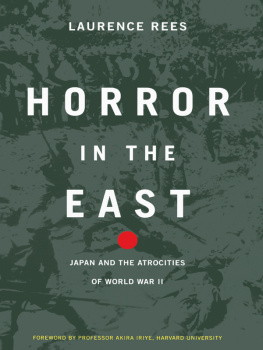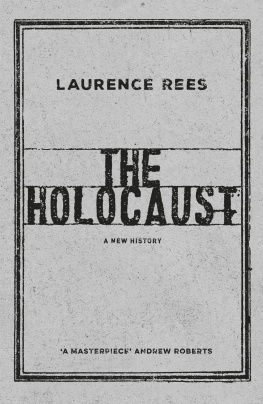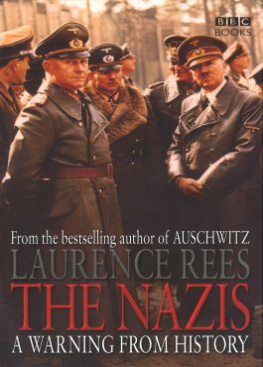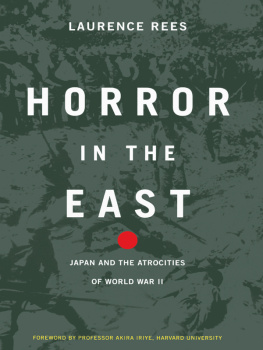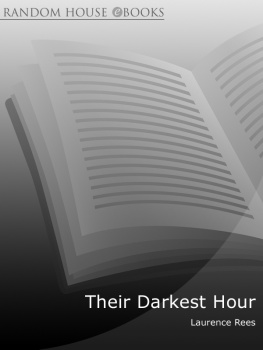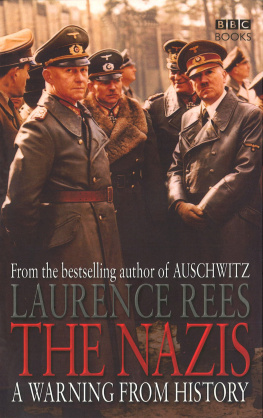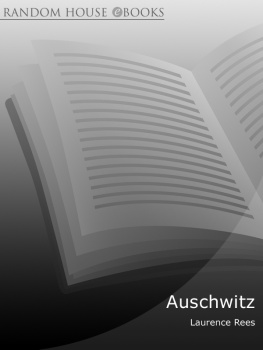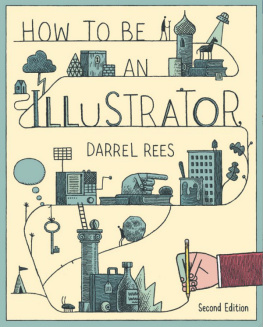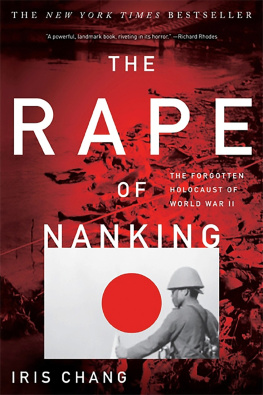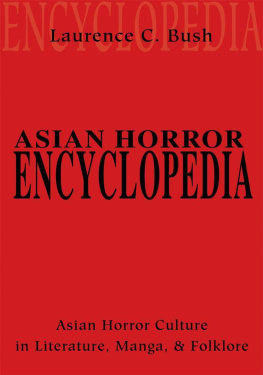LAURENCE REES - Horror in the East
Here you can read online LAURENCE REES - Horror in the East full text of the book (entire story) in english for free. Download pdf and epub, get meaning, cover and reviews about this ebook. year: 2012, publisher: Da Capo Press, genre: History. Description of the work, (preface) as well as reviews are available. Best literature library LitArk.com created for fans of good reading and offers a wide selection of genres:
Romance novel
Science fiction
Adventure
Detective
Science
History
Home and family
Prose
Art
Politics
Computer
Non-fiction
Religion
Business
Children
Humor
Choose a favorite category and find really read worthwhile books. Enjoy immersion in the world of imagination, feel the emotions of the characters or learn something new for yourself, make an fascinating discovery.
- Book:Horror in the East
- Author:
- Publisher:Da Capo Press
- Genre:
- Year:2012
- Rating:5 / 5
- Favourites:Add to favourites
- Your mark:
- 100
- 1
- 2
- 3
- 4
- 5
Horror in the East: summary, description and annotation
We offer to read an annotation, description, summary or preface (depends on what the author of the book "Horror in the East" wrote himself). If you haven't found the necessary information about the book — write in the comments, we will try to find it.
In the tradition of the best-selling Rape of Nanking, a provocative examination of Japanese atrocities during World War II. Another stunning slice of history from Laurence Rees. Daily Telegraph
Horror in the East — read online for free the complete book (whole text) full work
Below is the text of the book, divided by pages. System saving the place of the last page read, allows you to conveniently read the book "Horror in the East" online for free, without having to search again every time where you left off. Put a bookmark, and you can go to the page where you finished reading at any time.
Font size:
Interval:
Bookmark:
of World War II

Copyright 2001 by Laurence Rees.
All rights reserved. No part of this publication may be reproduced, stored in a retrieval system,
or transmitted, in any form or by any means, electronic, mechanical, photocopying, recording,
or otherwise, without the prior written permission of the publisher.
Printed in the United States of America.
First published in 2001 by BBC Books, an imprint of BBC Worldwide Publishing,
BBC Worldwide Limited, Woodlands, 80 Wood Lane, London W12 OTT.
(Published to accompany the television series Horror in the East, first broadcast on
BBC 2 in 2000.) Writer and producer: Laurence Rees.
PICTURE CREDITS
Photo Section 1:
Mainichi, Tokyo; Mainichi; NARA; Popperfoto; Hulton Getty; NARA; Hulton Getty;
Hulton Getty; Hulton Getty; Hulton Getty; Mainichi; Imperial War Museum.
Photo Section 2:
Hulton Getty; Hulton Getty; Jan Ruff; Masayo Enomoto; Popperfoto; Imperial War Museum;
Naruto House; Imperial War Museum; Hulton Getty; Australian War Memorial;
Australian War Memorial; Bill Hedges; Hulton Getty; NARA.
Photo Section 3:
Kenichiro Oonuki; Hulton Getty; Hulton Getty; NARA; Ralph Crane/Timepix; Hulton Getty;
Yoshiko Hashimoto; Ishikawa Kiyoko; Ishikawa Kiyoko; NARA; Hulton Getty;
NARA; Michael Witowich; Hulton Getty; Corbis.
Cataloging-in-Publication data for this book is available from the Library of Congress.
First Da Capo Press edition 2002
Reprinted by arrangement with BBC Worldwide Ltd.
ISBN 0-306-81178-2
eBook ISBN: 9780786746897
Published by Da Capo Press
A Member of the Perseus Books Group
http://www.dacapopress.com
Da Capo Press books are available at special discounts for bulk purchases in the
U.S. by corporations, institutions, and other organizations. For more information,
please contact the Special Markets Department at the Perseus Books Group,
11 Cambridge Center, Cambridge, MA 02142, or call (800) 255-1514 or (617) 252-5298,
or e-mail .
1 2 3 4 5 6 7 8 906 05 04 03 02
To Benedict Rees and Ann Cattini
C an history be shared? This is the key question Laurence Rees raises in this important book. And the book gives a resoundingly affirmative response to that question.
There is a temptation to view a nations past primarily, if not entirely, in the national framework: to consider its history as sui generis, a product of its own culture, to be understood in the context of its own indigenous development. A recent school textbook in Japan one that has aroused a storm of protest from Korea, China, and other countries states that there are as many histories as there are nations, with the implication that a countrys history must be comprehended, appreciated, and judged in terms of its peoples ideas, interests, and values. Defenders of this sort of self-centred nationalism and such people are found everywhere believe that a given people understand their history better than other peoples, and that foreigners should not stand in judgment over it.
Horror in the East, both as a documentary and as a book, takes the opposite view. It has been produced on the assumption that the past must be shared, that it is open to anyone to examine, and that the quest for historical understanding knows no national boundaries. Japanese, Chinese, Koreans, Filipinos, Australians, Americans, British, and others who appear in the book (and in the documentary film) all seek to understand, whether as participants in past dramas or as contemporary commentators, the human tragedy that was the horror in Asia during the Second World War.
To speak ofhorror, of course, implies moral judgment. But the judgment is not necessarily that of one nation condemning another nation, for no nation is free of moral culpability. Rather, the judgment is, first, the application of universal human standards to specific deeds of barbarism committed by individuals; it is, second, an effort to understand why atrocities of such magnitude were perpetrated at specific moments in time; it is, finally, an act of linking the present to the past in which todays generation speaks to an earlier generation.
The book is rich in detail, containing some episodes the BBC team discovered in dust-covered archives in Japan, the United States, Britain, the Netherlands, Australia and elsewhere. The interviews, especially of Japanese veterans, are vivid reminders of what it was like to live, and to face certain death, in the valley of darkness, the term that is often used to describe the war years. There are no taboos in the story; Rees, for instance, asks pertinent questions about the role of the emperor and examines them dispassionately, avoiding dogmas and emotional rhetoric. Above all, the book succeeds in putting Japans wartime policies and behaviour in the context of a conformist society under pressure. As one who grew up during the war I was in fifth grade when the war ended I can attest to the truth of this argument. The power of conformism, the ardent wish not to be different, a misguided sense of honour which dictates that dissent will disgrace the nation, the family, and yourself these traits still exist in Japan, and in many other countries, today. But the book suggests that there are others, those who are willing to speak candidly about the past, not merely among themselves but also with people from other lands. To the extent that Horror in the East reveals the existence of such people, the book points to the emergence of an international arena where memory and history may be shared and openly discussed, where what the author aptly refers to as a common thread transcending national or cultural differences may be found.
Professor Akira Iriye
Harvard University
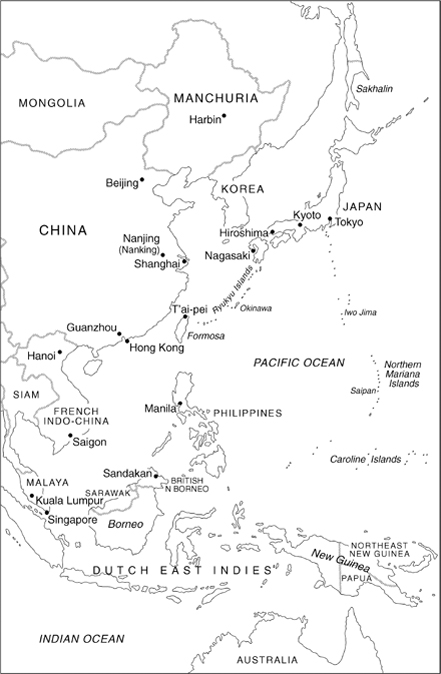
I nscrutable that is the adjective most often used to describe the Japanese. And on the face of it, what could be more inscrutable than their actions during the Second World War? Their attack on Pearl Harbor, their worship of their emperor as a God, their willingness to die in kamikaze attacks, their appalling treatment of Allied prisoners of war, their war crimes against women and children in China all these actions and more are hard, if not impossible, for Westerners to understand.
I fully expected to run into this concrete wall ofinscrutability in our quest to understand why the Japanese acted as they did during the war just as I had when, years before, I had asked an intelligent, sophisticated Japanese friend what she knew about the most infamous atrocity committed by the Imperial Army, the Nanking massacre of 1937. Ah, she replied, smiling, I did study history at school, but you must understand, Japanese history is many thousands of years old and very complex. Its a very, very big book we have to study. And, of course, we start at the beginning of the history and study hard and in detail. So, unfortunately, by the time I left school we hadnt finished the whole history....I think perhaps we stopped at the end of the nineteenth century. We just didnt get around to looking at the Nanking massacre.
The desire of many Japanese to answer uncomfortable questions in a similarly evasive way, and so preserve the harmony of their society, is intense. No one spends more than a few weeks in Japan without discovering the Japanese desire to fit in to their society, to preserve the
Font size:
Interval:
Bookmark:
Similar books «Horror in the East»
Look at similar books to Horror in the East. We have selected literature similar in name and meaning in the hope of providing readers with more options to find new, interesting, not yet read works.
Discussion, reviews of the book Horror in the East and just readers' own opinions. Leave your comments, write what you think about the work, its meaning or the main characters. Specify what exactly you liked and what you didn't like, and why you think so.

